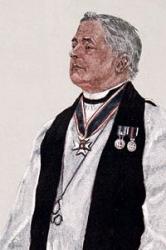
1836 - 1896 Person Name: Rev. Thomas Benson Pollock, *1836-1896) Author of "Jesus, once an infant small" in The Praise Hymnal Pollock, Thomas Benson, M.A., was born in 1836, and graduated at Trinity College, Dublin, B.A. 1859, M.A. 1863, where he also gained the Vice-Chancellor's Prize for English Verse in 1855. Taking Holy Orders in 1861, he was Curate of St. Luke's, Leek, Staffordshire; St. Thomas's, Stamford Hill, London; and St. Alban's, Birmingham. Mr. Pollock is a most successful writer of metrical Litanies. His Metrical Litanies for Special Services and General Use, Mowbray, Oxford, 1870, and other compositions of the same kind contributed subsequently to various collections, have greatly enriched modern hymnbooks. To the 1889 Supplemental Hymns to Hymns Ancient & Modern, Mr. Pollock contributed two hymns, “We are soldiers of Christ, Who is mighty to save" (Soldiers of Christ), and "We have not known Thee as we ought" (Seeking God), but they are by no means equal to his Litanies in beauty and finish.
-- John Julian, Dictionary of Hymnology (1907)
===================
Pollock, T. B. , 900, i. We note:—
1. God of mercy, loving all. Litany for Quinquagesima. In the Gospeller, 1872.
2. Great Creator, Lord of all. Holy Trinity. In the Gospeller, 1876.
3. Holy Saviour, hear me; on Thy Name I call. Litany of the Contrite. In the Gospeller, 1870. From it "Faithful Shepherd, feed me in the pastures green," is taken.
4. Jesu, in Thy dying woes, p. 678, ii. 36. Given in Thring's Collection, 1882, in 7 parts, was written for the Gos¬peller.
5. My Lord, my Master, at Thy feet adoring. Passiontide. Translation of "Est-ce vous quo je vois, 6 mon Maître adorable!" (text in Moorsom's Historical Comp. to Hymns Ancient & Modern, 1889, p. 266), by Jacques Bridaine, b. 1701, d. 1767. Moorsom says he was born. at Chuselay, near Uzes, in Languedoc, and was a Priest in the French Church. The translation made in 1887 was included in the 1889 Supplemental Hymns to Hymns Ancient & Modern.
6. We are soldiers of Christ, p. 900, i. In the Gospeller, 1875.
7. Weep not for Him Who onward bears. Passiontide. No. 495 in the 1889 Suppl. Hymns to Hymns Ancient & Modern is part of a hymn in the Gospeller, 1870.
--John Julian, Dictionary of Hymnology, Appendix, Part II (1907)
Thomas Benson Pollock


 My Starred Hymns
My Starred Hymns






